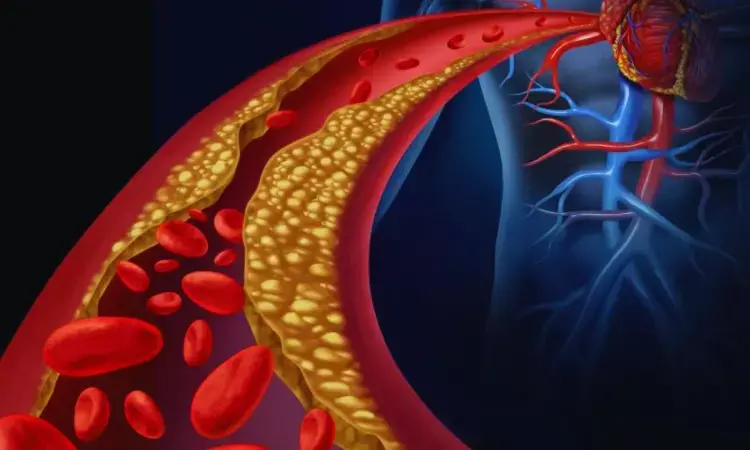- Home
- Medical news & Guidelines
- Anesthesiology
- Cardiology and CTVS
- Critical Care
- Dentistry
- Dermatology
- Diabetes and Endocrinology
- ENT
- Gastroenterology
- Medicine
- Nephrology
- Neurology
- Obstretics-Gynaecology
- Oncology
- Ophthalmology
- Orthopaedics
- Pediatrics-Neonatology
- Psychiatry
- Pulmonology
- Radiology
- Surgery
- Urology
- Laboratory Medicine
- Diet
- Nursing
- Paramedical
- Physiotherapy
- Health news
- Fact Check
- Bone Health Fact Check
- Brain Health Fact Check
- Cancer Related Fact Check
- Child Care Fact Check
- Dental and oral health fact check
- Diabetes and metabolic health fact check
- Diet and Nutrition Fact Check
- Eye and ENT Care Fact Check
- Fitness fact check
- Gut health fact check
- Heart health fact check
- Kidney health fact check
- Medical education fact check
- Men's health fact check
- Respiratory fact check
- Skin and hair care fact check
- Vaccine and Immunization fact check
- Women's health fact check
- AYUSH
- State News
- Andaman and Nicobar Islands
- Andhra Pradesh
- Arunachal Pradesh
- Assam
- Bihar
- Chandigarh
- Chattisgarh
- Dadra and Nagar Haveli
- Daman and Diu
- Delhi
- Goa
- Gujarat
- Haryana
- Himachal Pradesh
- Jammu & Kashmir
- Jharkhand
- Karnataka
- Kerala
- Ladakh
- Lakshadweep
- Madhya Pradesh
- Maharashtra
- Manipur
- Meghalaya
- Mizoram
- Nagaland
- Odisha
- Puducherry
- Punjab
- Rajasthan
- Sikkim
- Tamil Nadu
- Telangana
- Tripura
- Uttar Pradesh
- Uttrakhand
- West Bengal
- Medical Education
- Industry
Alirocumab and high-intensity statin combo may significantly regress coronary plaque burden in familial hypercholesterolemia

Spain: Alirocumab-combined with high-intensity statin therapy-led to a greater coronary plaque burden (PB) regression in patients with familial hypercholesterolemia (FH) with higher baseline PB and with a larger unstable core, according to the ARCHITECT Study. The study findings were published online in Circulation: Cardiovascular Imaging on January 11, 2024.
"At the 78-week follow-up period, global coronary plaque burden decreased from 34.6% to 30.4%, indicating a significant reduction of −4.6%," the researchers reported.
"Notably, a greater baseline plaque burden and a larger proportion of unstable core (fibro–fatty + necrotic plaque) were linked with greater plaque burden regression," they wrote.
Intensive lipid-lowering therapy may induce regression of coronary atherosclerosis. Nevertheless, the factors underlying the lipid-lowering therapy effect on disease regression remain poorly characterized. Therefore, Leopoldo Pérez de Isla and colleagues from Spain aimed to determine the characteristics of atherosclerotic plaque, which are associated with a greater reduction in coronary plaque burden after treatment with alirocumab in patients with familial hypercholesterolemia.
For this purpose, the researchers conducted the ARCHITECT study, a phase IV, open-label, multicenter, single-arm clinical trial. They assessed the effect of alirocumab treatment for 78 weeks on the coronary atherosclerotic PB and its characteristics in subjects with FH without clinical atherosclerotic cardiovascular disease (CVD).
Participants underwent a coronary computed tomographic angiography at baseline and a final one at 78 weeks. Every patient received subcutaneously alirocumab 150 mg every 14 days in addition to high-intensity statin therapy.
The study enrolled one hundred and four patients. The median age was 53.3 years and 51.9% were women.
The key findings of the study were as follows:
- There was a change in global coronary PB from 34.6% at entry to 30.4% at follow-up, a −4.6% reduction.
- A decrease in the percentage of unstable core (fibro-fatty+necrotic plaque; from 14.1 to 8.0; −6.6%) was noted.
- A greater PB (β, 0.36) and a higher proportion of unstable core (β, 0.15) were significantly related to PB regression.
The findings showed that treatment with alirocumab in addition to high-intensity statin therapy led to greater PB regression in patients with familial hypercholesterolemia with higher baseline PB and in those with larger unstable core.
"Further studies are needed to corroborate the hypothesis raised by these results," the research team concluded.
Reference:
Pérez de Isla L, Díaz-Díaz JL, Romero MJ, Muñiz-Grijalvo O, Mediavilla JD, Argüeso R, de Andrés R, Fuentes F, Sánchez Muñoz-Torrero JF, Rubio P, Álvarez-Baños P, Mañas D, Suárez Gutierrez L, Saltijeral Cerezo A, Mata P; SAFEHEART Investigators. Characteristics of Coronary Atherosclerosis Related to Plaque Burden Regression During Treatment With Alirocumab: The ARCHITECT Study. Circ Cardiovasc Imaging. 2024 Jan;17(1):e016206. doi: 10.1161/CIRCIMAGING.123.016206. Epub 2024 Jan 11. PMID: 38205656.
Dr Kamal Kant Kohli-MBBS, DTCD- a chest specialist with more than 30 years of practice and a flair for writing clinical articles, Dr Kamal Kant Kohli joined Medical Dialogues as a Chief Editor of Medical News. Besides writing articles, as an editor, he proofreads and verifies all the medical content published on Medical Dialogues including those coming from journals, studies,medical conferences,guidelines etc. Email: drkohli@medicaldialogues.in. Contact no. 011-43720751


